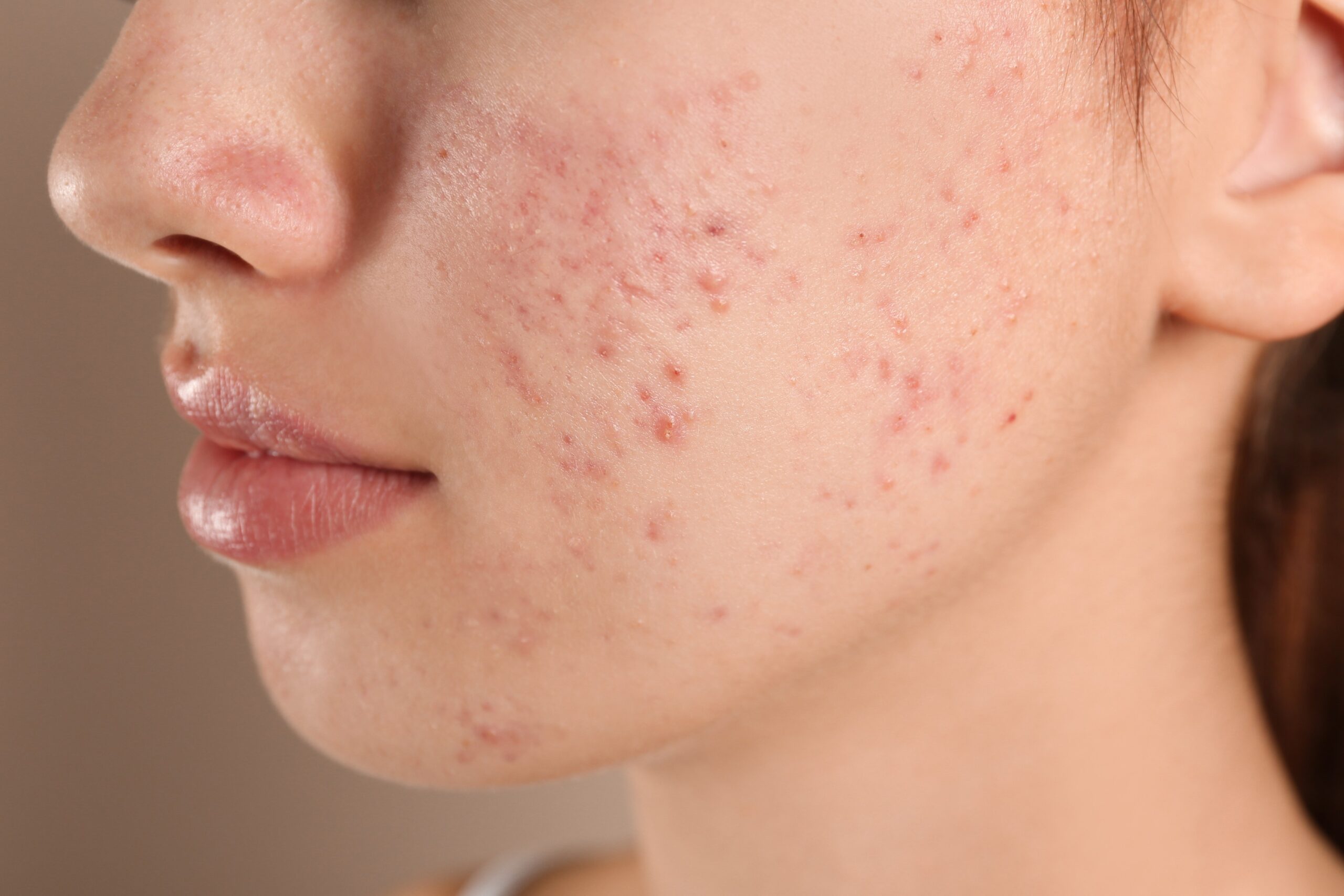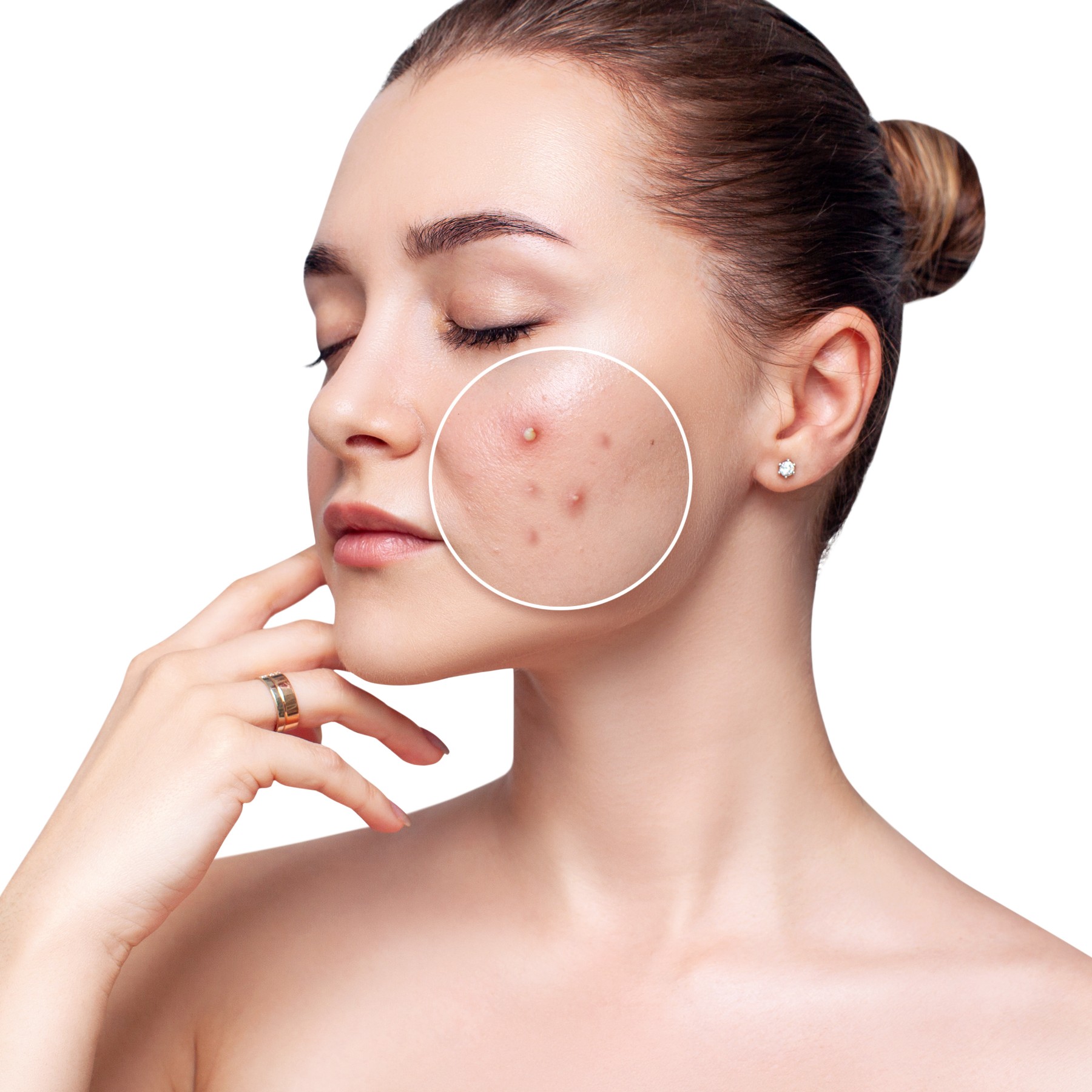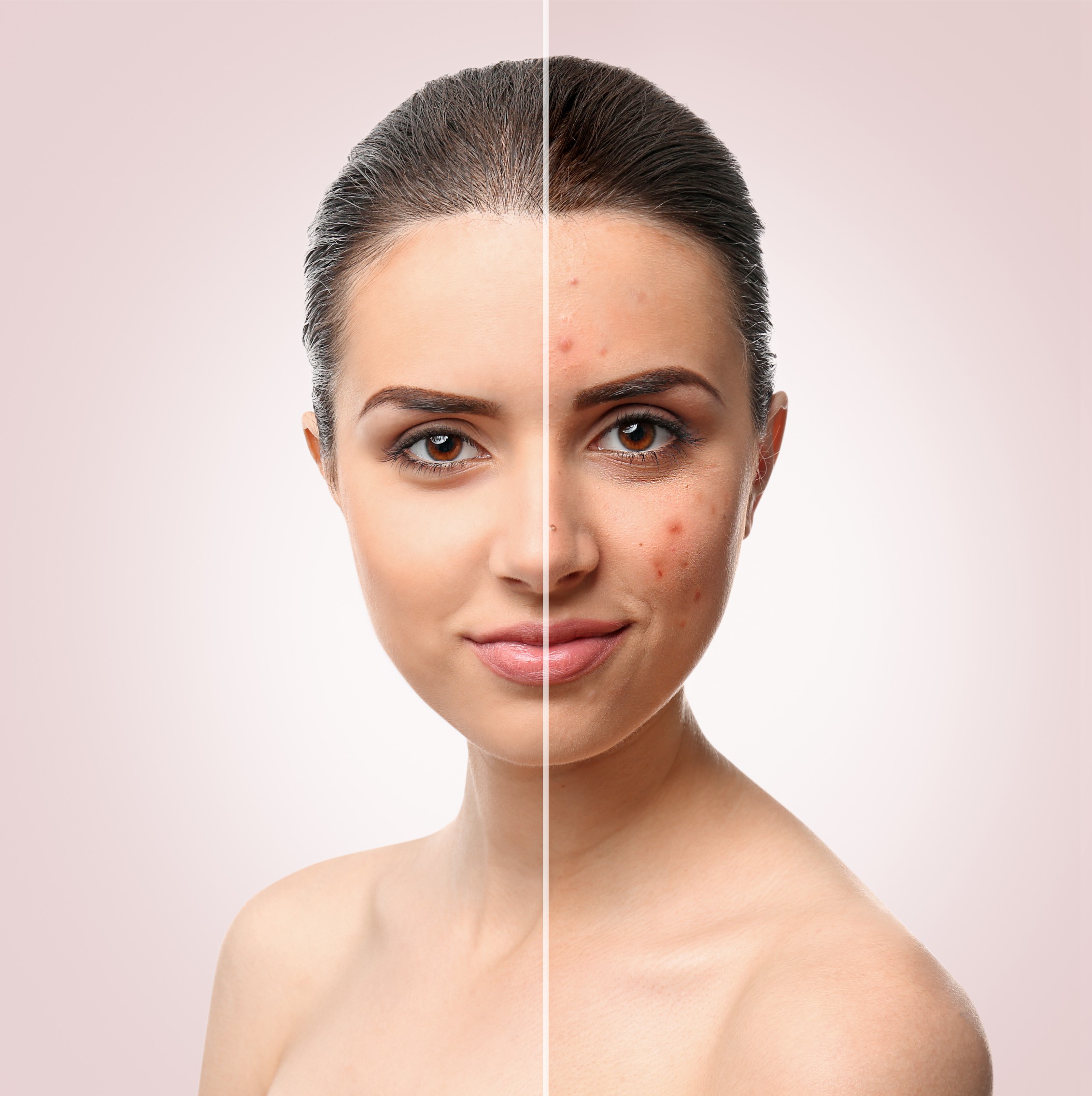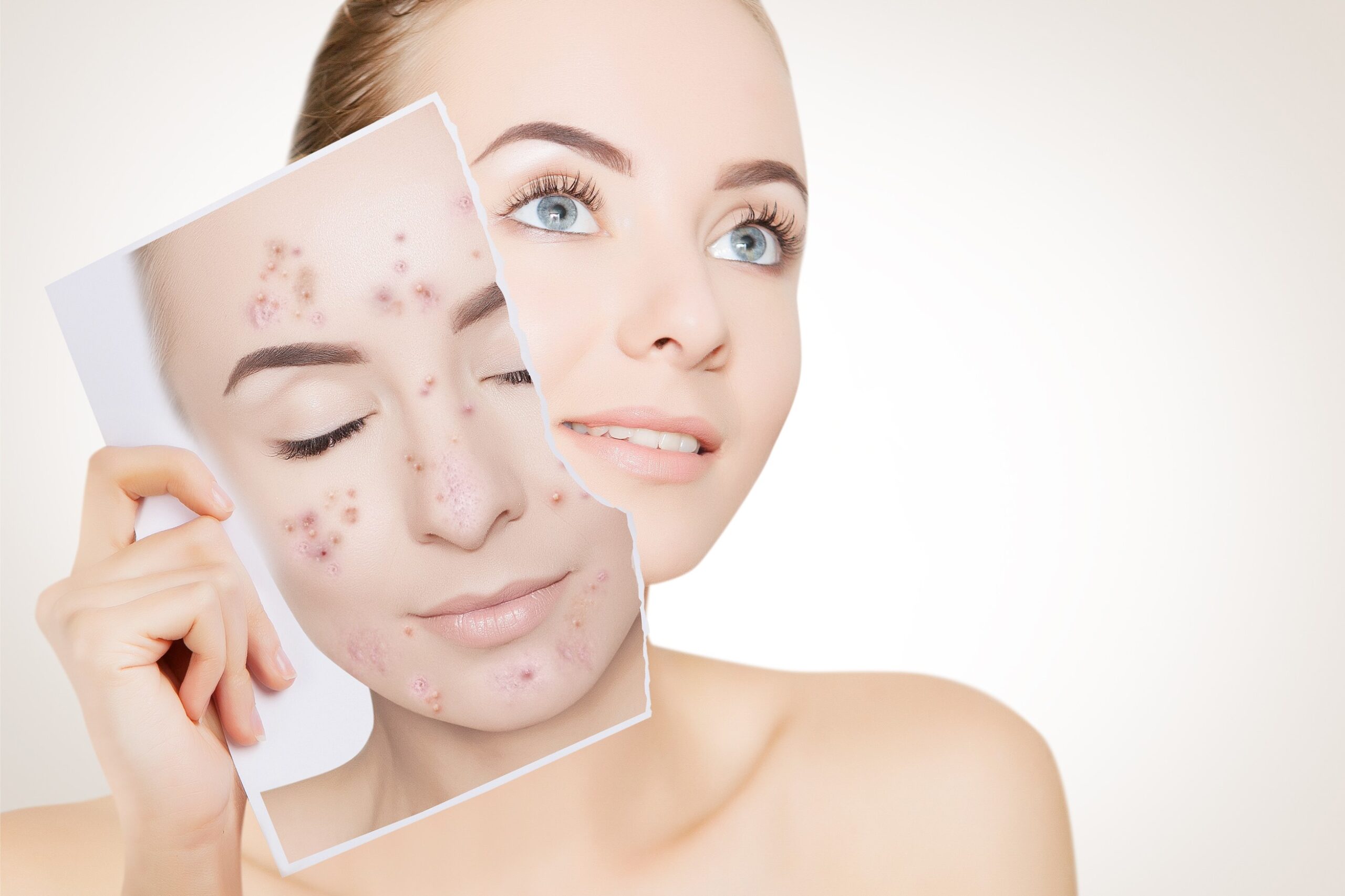
Acne
Acne, a prevalent skin condition affecting individuals of all ages, is characterized by the formation of pimples, blackheads, and cysts. It’s more than just a cosmetic concern; acne can significantly impact one’s confidence and quality of life. Understanding acne and its treatment is paramount for effective management and achieving clearer, healthier skin. By learning about the causes, symptoms, and available treatment options, individuals can take proactive steps to address their acne concerns and improve their overall well-being. Whether dealing with occasional breakouts or persistent acne, education empowers individuals to make informed decisions about their skincare and seek appropriate treatment tailored to their needs.
Causes of Acne
Acne develops when sebaceous glands become clogged with oil and dead skin cells, leading to inflammation and the formation of pimples, blackheads, and cysts. Several factors contribute to the development of acne, making it a complex skin condition. Hormonal changes, especially during puberty or menstruation, can increase oil production in the skin, making individuals more prone to breakouts. Furthermore, genetics can predispose individuals to acne, as it tends to run in families. Understanding these underlying causes is essential in effectively managing acne and preventing future breakouts. By addressing these factors and adopting appropriate skincare routines, individuals can take control of their acne and achieve clearer, healthier skin.
Signs and Symptom
Acne can manifest in various forms, each presenting its own set of symptoms and characteristics. Common types of acne include whiteheads, blackheads, and cysts. Whiteheads, also known as closed comedones, appear as small, flesh-colored bumps on the skin’s surface. Blackheads, or open comedones, are similar to whiteheads but have a dark appearance due to oxidation of trapped debris. Cysts are larger, pus-filled lesions that are often painful and can cause scarring. Recognizing the signs of acne involves identifying these different types of lesions on the skin, as well as other common symptoms such as redness, inflammation, and tenderness. Additionally, acne may vary in severity, ranging from occasional breakouts to more persistent and widespread eruptions. Understanding the signs and symptoms of acne is crucial for early detection and effective management, empowering individuals to seek appropriate treatment and achieve clearer, healthier skin.
Effects on Health
Acne can have significant effects on both physical and mental health. Physically, acne can lead to scarring, particularly if the lesions are picked or squeezed. These scars can persist long after the acne itself has cleared, affecting one’s appearance and confidence. Additionally, acne can cause discomfort, ranging from mild itching and irritation to more severe pain and inflammation. Beyond its physical effects, acne can also take a toll on mental health. The visible nature of acne lesions can lead to feelings of self-consciousness and low self-esteem, impacting overall well-being. Acne may also affect social interactions, as individuals may feel embarrassed or ashamed of their skin and avoid social situations as a result. Addressing both the physical and psychological effects of acne is essential for comprehensive management and improving quality of life.
Do you have any questions about acne?
At FCP Dermatology we offer a wide range of surgical and cosmetic Dermatology services, in a 5-star luxury setting.
- +1 (416) 861-8600
- Contact via Email
Acne Treatment
Acne Scarring Microneedling
Hydrafacial
Vampire Facial
Natural Green Peel Facial
Carbon Peel Facial
Excel V+ Laser for Redness
View Available Treatments
Treatments for Acne
When it comes to treating acne and acne scars there are various options available. These treatments include:
- Green peel: This treatment utilizes natural herbal ingredients to exfoliate the skin, promoting cell renewal and reducing acne inflammation.
- Carbon peel: Involving the use of a carbon-based lotion, this treatment targets acne-causing bacteria and excess oil, resulting in smoother and clearer skin.
- Hydrafacial: A non-invasive procedure that cleanses, exfoliates, extracts, and hydrates the skin using serums and blue light to address acne concerns.
- Acne Scarring Microneedling: This treatment uses fine needles to create controlled micro-injuries in the skin, stimulating collagen production and improving the appearance of acne scars.
- Vampire facial: Also known as PRP (platelet-rich plasma) therapy, this treatment involves using the patient’s own blood to stimulate collagen production and rejuvenate the skin, reducing acne scars and improving overall skin texture.
- PICO FX: A laser treatment that targets acne scars and pigmentation, breaking down scar tissue and promoting collagen remodeling for smoother skin.
- Excel V+ for red scars: This laser treatment specifically targets red scars caused by acne, reducing redness and inflammation for a more even complexion.
- Pico Genesis for brown scars: Using picosecond laser technology, this treatment targets brown scars and pigmentation, breaking down excess melanin to improve skin tone and texture.
Acne
Choosing the Right Treatment
When deciding on the appropriate treatment for acne, several factors should be taken into consideration to ensure the best possible outcome. Firstly, understanding your skin type and the severity of your acne is crucial, as certain treatments may be more suitable for oily or sensitive skin, while others may be better suited for severe or persistent acne. Additionally, considering personal preferences such as treatment preferences, lifestyle, and down time can help narrow down the options. However, consulting with a dermatologist is paramount in making an informed decision. A dermatologist can assess your individual needs, provide personalized recommendations, and tailor a treatment plan to address your specific concerns effectively. Their expertise and guidance can help navigate the myriad of treatment options available, ultimately leading to clearer, healthier skin.

Recovery and Results
After undergoing acne treatment, it’s essential to understand what to expect during the recovery process and the anticipated results. The recovery period varies depending on the treatment chosen. For example, treatments like Carbon peel and Hydrafacial typically have minimal downtime, with patients able to resume their daily activities immediately. Green peel and Acne Scarring Microneedling may have a slightly longer recovery period, with some redness and mild swelling expected for a few days following the procedure. It’s essential to follow post-treatment instructions provided by your dermatologist to optimize results and minimize any discomfort. As for the results, improvements in acne symptoms can typically be seen within a few weeks to a few months, depending on the treatment’s efficacy and the individual’s response. While some treatments may provide immediate results, others may require multiple sessions for optimal outcomes. Overall, patience and consistency are key during the recovery process, as they can lead to clearer, healthier skin over time.
Acne
Follow up Treatments
Follow-up care after acne treatment is crucial for ensuring the effectiveness of the chosen treatment and addressing any concerns or complications that may arise. Regular follow-up appointments with your dermatology clinic allow for the monitoring of your skin’s progress, evaluation of treatment efficacy, and adjustments to the treatment plan if necessary. These appointments also provide an opportunity to discuss any new developments or changes in your skin condition, allowing for timely intervention and optimization of results. Additionally, follow-up care may involve ongoing guidance on skincare routines, lifestyle modifications, and preventive measures to help maintain clear, healthy skin in the long term.

Maintaining Results
Maintaining clear skin post-acne treatment is essential for long-term success and preventing future breakouts. One key aspect is establishing a consistent skincare routine tailored to your skin type and concerns. This routine should include gentle cleansing to remove dirt and excess oil, followed by the use of non-comedogenic moisturizers and acne-fighting ingredients such as retinol. Additionally, incorporating sunscreen into your daily regimen can protect your skin from harmful UV rays and prevent post-inflammatory hyperpigmentation. Avoiding triggers like touching your face, using harsh skincare products, and smoking can further help prevent acne flare-ups.
Safety Considerations
When considering acne treatment options, it’s essential to be aware of the potential side effects and risks associated with each method. Common side effects may include temporary redness, swelling, and mild discomfort, particularly with treatments like Green peel and Acne Scarring Microneedling. To minimize risks, it’s crucial to choose a reputable Dermatologist experienced in administering the chosen treatment. Additionally, following pre- and post-treatment instructions provided by your Dermatologist can help reduce the likelihood of adverse effects. Be sure to disclose any medical conditions or allergies to your provider before undergoing treatment to ensure your safety.

Acne FAQ
Frequently Asked Questions about Acne
Acne develops when sebaceous glands become clogged with oil and dead skin cells, leading to inflammation and the formation of pimples, blackheads, and cysts.
No, acne can affect individuals of all ages, from adolescents to adults.
Hormonal changes, genetics, and certain medications can all contribute to the development of acne.
Maintaining good skincare habits, avoiding harsh products, avoid touching or picking at your face.
Common types of acne lesions include whiteheads, blackheads, papules, pustules, nodules, and cysts.
Over-the-counter products are not typically strong enough to fight acne. Without a Dermatologist to guide you, some of these products can worsen acne and cause irritation.
You should consider seeing a dermatologist as soon as you are experiencing acne.
Prescription treatments for acne include topical medications and oral medications like antibiotics or isotretinoin which have a large list of side effects. Consider in-clinic procedures at FCP Dermatology such as peels or laser therapy.
Population-wide studies have shown that only skim milk can contribute to acne. That being said, everyone is different. If you eat a chocolate bar and find you get acne, then this may be a cause for you specifically.
The timeline for acne treatment effectiveness varies depending on the severity of the acne and the chosen treatment method. It may take several weeks to months to see significant improvement.
Yes, there are various treatments available for acne scars, including laser therapy, microneedling, chemical peels, dermal fillers, and subcision.
Some natural remedies, such as tea tree oil, aloe vera, and green tea extract claim to help acne. Good quality studies are lacking and allergic dermatitis from these treatments is very common.
There are no high quality studies currently that prove that stress contributes to breakouts.
A gentle skincare routine that includes cleansing, moisturizing, retinol, and using non-comedogenic products can help keep acne-prone skin clear.
Certain makeup products, particularly oil-based or pore-clogging formulas, may exacerbate acne. Opt for non-comedogenic and oil-free makeup products.
While sun exposure can improve acne by drying out pimples, sun also increases the risk of skin damage, skin cancer, and premature aging.
Yes, hormonal changes during pregnancy can lead to acne breakouts in some women. It's essential to consult with a dermatologist before using acne treatments during pregnancy.
Genetics can influence an individual's predisposition to acne. If one or both parents had acne, there's a higher likelihood of developing acne as well.
While acne cannot be cured permanently, it can be effectively managed with proper treatment and skincare habits, leading to clearer, healthier skin.
Preventing acne scarring involves treating acne promptly, avoiding picking or squeezing pimples, and using sunscreen to protect against sun damage..
